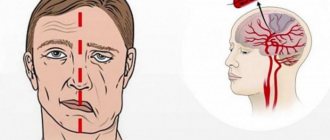September 6, 2018
Often, chronic illness occurs along with depression. Moreover, some of these diseases can cause it. According to statistics, a third of all patients suffering from chronic diseases are depressed. What are the symptoms? How to overcome depression? What kind of diseases provoke its appearance? Read about this in our article.
Symptoms of depression in chronic illness
For some people, chronic illness becomes part of their life. It lasts for a long time and most often does not heal completely. In this case, the condition of patients is controlled with the help of medications, physical activity and a special diet. Chronic diseases include diseases such as HIV, diabetes, arthritis, multiple sclerosis, etc.
It's not surprising that depression can occur when you have a chronic illness. After all, the disease significantly changes the patient’s usual lifestyle. For example, this manifests itself in limited ability to move independently and take care of oneself. Due to a chronic illness, the patient often has to give up favorite activities, which undermines his hope for a bright future. Under such circumstances, the patient begins to be overcome by sadness and despair. In addition, depression can be caused by physical aspects of the disease or side effects of medications used.
As for the symptoms, with a chronic disease they often go unnoticed, not only by the patient’s family, but also by himself. After all, when fighting an illness, most people consider constant depression and sadness to be completely normal manifestations. Often, the symptoms of depression are disguised as other physical ailments that treatment is aimed at combating. However, depression itself is not eliminated. After all, its treatment must be carried out separately.
Manifestations of depression and stress
The main manifestations of stress are anxiety and restlessness. A person is constantly worried, often without adequate reason, “over trifles.” Easily fatigue, sleep disturbance (restless sleep, waking up early before the alarm, daytime drowsiness), irritability are added. It is not uncommon to experience panic attacks, which are characterized by sudden attacks of anxiety and fear.
Only an experienced psychotherapist can make an accurate diagnosis. It is important to determine the type of depression, because each option has its own treatment regimen.
The main symptoms of depression are the so-called depressive triad, which includes:
- low mood, depression, depression;
- mental retardation - lethargy, passivity, taciturnity, lack of emotions, loss of appetite, lack of initiative; thoughts around the same worries, often unfounded feelings of guilt, pessimism;
- motor retardation - severe weakness, a feeling of powerlessness, a person strives to take one position and may not move for days - for example, lying in bed, constantly looking at the ceiling. Some people, on the contrary, do not find a place for themselves - they walk around the room anxiously, wring their hands, and cry.
One of the symptoms that significantly reduces the quality of life of a patient with depression is sleep disturbance. It is characterized by the inability to fall asleep for a long time and short, superficial sleep that does not bring a feeling of rest. Insomnia, stress, depression are manifestations of mental illness and problems in the nervous system. Sleep disturbance should alert you and become a reason to consult a specialist.
Important
Sleep disturbances - insomnia, early awakening - these are often the first symptoms of incipient depression. It’s better to get treatment right away, because then it becomes more and more difficult to work, you don’t want to leave the house, thoughts of suicide come.
Symptoms of stress and depression are often subtle. A person may deny for a long time or not notice that stress is taking away more and more strength from him. Depression and fatigue, irritability and difficulty concentrating are perceived as the norm; a person does not remember that it used to be different. Rest and a change of environment, a diet rich in vitamins will only help along with the main treatment - psychotherapy and medication support.
Chronic diseases caused by depression
Of course, any serious illness can cause depression. The risk of its occurrence depends on two factors: the degree of complexity of the disease and changes in the patient’s life because of it. The risk of developing depression in men is 5-12%, while in women it is 10-25%. In the presence of a chronic disease, the risk of its occurrence increases to 33%.
Depression, which occurs with a chronic disease, worsens the patient's condition. This is especially true in cases where the disease does not allow him to lead a full life or causes severe pain or fatigue. Moreover, depression can increase pain and fatigue. At the same time, it can lead to the fact that the patient wants to isolate himself from society, which, most likely, will only worsen his condition.
Below are statistics on the occurrence of depression in various chronic diseases:
- stroke – from 10 to 27%;
- coronary artery disease – from 18 to 20%;
- diabetes – 25%;
- cancer – 25%;
- chronic pain syndrome – from 30 to 54%;
- multiple sclerosis – 40%;
- Parkinson's disease – 40%;
- heart attack - from 40 to 60%.
The missing hormone of happiness
Stress, melancholy, despondency, and neuroses caused by these conditions are caused by a lack of serotonin, a neurotransmitter whose main task is to regulate our mood and keep it on a positive wave. If this substance is not available, it must be obtained. It is made from the amino acid tryptophan. And scientists discovered tryptophan itself in dietary protein. The beneficial amino acid has been found in many foods - from meat and fish to vegetables and fruits.
But during times of stress and prolonged depression, the body needs not only serotonin:
- When we are often worried, rarely calm and cheerful, and much more irritated or overly excited, the level of adrenaline and cortisol increases. To produce these hormones, you need vitamins C, B, as well as trace elements: zinc, magnesium. It turns out that all these valuable components are urgently confiscated. At the same time, we do not make up for their deficiency in any way, which leads to negative consequences: mental abilities decrease, metabolism slows down, lethargy, lethargy, and weakness occur. Even the skin becomes less elastic and beautiful - after all, vitamin C, along with zinc, is necessary for collagen synthesis. And a lack of magnesium can lead to migraines and high blood pressure.
- We also have an urgent need for adaptogens of natural origin - they help us adapt to stress - physical, emotional, mental or even chemical. They work in several directions at once: they increase the level of ATP, and with it the level of energy, protect cell membranes from damage, strengthen the heart and blood vessels - making us resilient, fast, and efficient. You can compare adaptogens to coffee. However, when we drink a cup of an invigorating drink, we know that the effect depends on how much we drink and what portion we choose. And in the case of “tonics,” it seems to us that the power lies within ourselves. This gives you self-confidence and allows you to maintain emotional stability.
Treatment of depression in chronic diseases
For depression resulting from a chronic illness, you should contact a clinical psychologist. Its early diagnosis and proper treatment will help avoid possible complications and even suicide. There are often cases that successful treatment leads to an improvement in the general well-being and condition of the patient, and also gives new strength to fight a chronic disease.
If depression occurs due to a physical disability or as a side effect of medications used, the treatment plan must be changed. In other cases, it must be treated as a separate disease. In approximately 80% of patients, depression is eliminated through the use of appropriate medications, psychotherapy, or a combination of treatments. As a rule, antidepressants begin to work within a couple of weeks. But regular consultations with your doctor are necessary to choose the most suitable medicine.
Foods for stress and neurosis: adaptogens in the diet against depression
Asian ginseng root
This is one of the most famous “tonics”, strengthening the immune system, reducing inflammation, and having anti-asthmatic and antioxidant effects. In China, red ginseng is traditionally used for overwork of the body and spirit. Doctors have proven that consuming an extract of this powerful adaptogen helps one adapt to unfavorable conditions, cope with stressful situations more easily, and increase performance.
Caution: Due to the strong stimulant effect, heart palpitations, insomnia may occur, and use in conjunction with products containing caffeine may lead to stomach and intestinal upsets. Ginseng extract as a remedy for stress and neuroses is not recommended for pregnant and lactating women.
Eleutherococcus
The shrub, growing in the mountains, is widely used in traditional Chinese medicine to treat flu and colds. But Eleutherococcus is also useful for chronic fatigue syndrome, apathy, and decreased concentration.
Possible side effects and contraindications for this remedy are the same as for ginseng.
Rhodiola rosea
This adaptogen helps improve memory, increase performance, reduces cortisol levels, and increases serotonin levels. This is a herbal antidepressant - a product for raising mood and stimulating mental activity. In addition, Rhodiola strengthens the heart and blood vessels and has a positive effect on brain function.
Ashwagandha
Another root that was actively used by the ancients. It came to us from Ayurvedic medicine, but is less known and popular than the listed adaptogens. This plant is actively used in the fight against apathy, causeless fatigue, neuroses, increased anxiety and panic attacks. Ashwagandha has a mild calming effect.
Contraindications: stomach ulcer, damage to the mucous membrane, pregnancy, lactation, hypersensitivity.
Other popular adaptogens include lemongrass, licorice, and green tea.
Useful tips for depression due to a chronic illness
To avoid depression if you have a chronic illness, consider the following tips:
- If you feel depressed for a long time, then do not delay, but quickly consult a doctor.
- Communicate more with other people. Spend time with family and friends as often as possible. If you don't have anyone to talk to, ask your doctor about support groups where people with the same illness share their experiences with each other.
- Try to do things that interest you, unless it interferes with your treatment. Being active will allow you not to lose faith in yourself and be part of society.
- Find out more about your condition. Read various articles and stories of patients with the same disease as you. You can find something interesting for yourself in them.
- If you constantly experience pain, consult your doctor about possible ways to eliminate it or at least alleviate it.
- Make sure the doctor is really right for you. You must completely trust him and calmly discuss with him all your questions regarding the disease.
- If you suspect that a drug you are taking is causing depression, contact your doctor immediately to find a different drug for you, if possible.
Thus, if a chronic disease causes bouts of depression in a patient, this will negatively affect the overall course of his treatment. Living with such a disease is a difficult ordeal. Therefore, sadness and despair are a natural reaction to the ongoing struggle with the disease. But if depression does not leave the patient for a long time, and in addition there is a disturbance in food and sleep patterns, as well as loss of interest in favorite activities, then it is necessary to seek help from a clinical psychologist as soon as possible.
Foods that improve your mood
Mood-boosting foods contain serotonin. Maintaining the balance of this chemical promotes increased resistance to stress as well as a sense of well-being. Scientists have compiled a list of foods that help increase serotonin levels.
1. Nuts and seeds.
Researchers from the University of Barcelona found that just 30 grams of mixed nuts per day will improve your mood, help fight obesity, and lower blood pressure and blood sugar.
2. Ocean fish or fish from cold seas (salmon and tuna).
This fish contains omega-3 fatty acids that reduce symptoms of depression. Research from the University of Pittsburgh School of Medicine found that people with higher levels of omega-3 fatty acids in their blood had fewer symptoms of depression and a more positive outlook.
3 eggs.
The American College of Nutrition found in research that people who eat eggs for breakfast feel more satisfied and therefore need fewer calories throughout the day compared to those whose breakfast consisted of high-carbohydrate foods, such as cereal or flour products. Therefore, by eating egg dishes for breakfast, you not only improve your mood, but also avoid excess weight. 4. Fruits and vegetables are also included in the list of mood-boosting foods.
Consume asparagus, lentils, chickpeas, beans, zucchini and sweet potatoes. Magnesium-rich leafy vegetables, apples, peaches, bananas and artichokes are very beneficial. 5. Avocado.
This fruit crop with a specific taste contains fatty acids, amino acids, as well as antioxidants and potassium. However, avocado fruits are very high in calories, so if you are losing weight, eat avocados instead of one full meal. 6. Soy.
Soy isoflavones also improve mood and regulate mental functions. This food is a rich source of plant proteins and phytoestrogens, which reduce the risk of cardiovascular disease. Add variety to your diet by using soy products: soy milk and its derivatives: tofu, tempeh, miso. 7. Dark chocolate contains an antioxidant called resveratrol.
This substance increases endorphin and serotonin levels in the brain, improving mood. The recommended dose is 30 grams per day.
By consuming these products daily, you will always be in a good mood, avoid overeating caused by stress, constipation in adults, and therefore, you will not gain excess weight.











